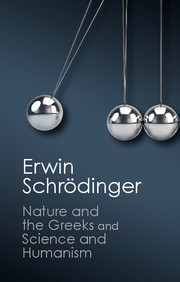Book contents
- Frontmatter
- Contents
- Foreword
- NATURE AND THE GREEKS
- Dedication
- I The motives for returning to ancient thought
- II The competition, reason v. senses
- III The Pythagoreans
- IV The Ionian Enlightenment
- V The religion of Xenophanes. Heraclitus of Ephesus
- VI The Atomists
- VII What are the special features?
- Bibliography
- SCIENCE AND HUMANISM
II - The competition, reason v. senses
Published online by Cambridge University Press: 05 October 2014
- Frontmatter
- Contents
- Foreword
- NATURE AND THE GREEKS
- Dedication
- I The motives for returning to ancient thought
- II The competition, reason v. senses
- III The Pythagoreans
- IV The Ionian Enlightenment
- V The religion of Xenophanes. Heraclitus of Ephesus
- VI The Atomists
- VII What are the special features?
- Bibliography
- SCIENCE AND HUMANISM
Summary
The short passage from Burnet and the longer one quoted from Gomperz at the end of the last chapter form the selected ‘text’, as it were, of this little book. We shall return to them later, when we shall try to answer the question: what is, then, that Greek way of thinking about the world? What are those peculiar traits, in our present scientific world view, that originated from the Greeks, whose special inventions they were, that are thus not necessary but artificial, being only historically produced and thus capable of change or modification, and which we, by ingrained habit, are liable to regard as natural and inalienable, as the only possible way of looking at the world?
However, at the moment we shall not yet enter on this main question. Rather, by way of preparing the answer, I wish to introduce the reader to parts of ancient Greek thought which I consider relevant in our context. In this I shall not adopt a chronological arrangement. For I am neither willing nor competent to write a brief history of Greek philosophy, there being so many good, modern and attractive ones (particularly Bertrand Russell's and Benjamin Farrington's) at the disposal of the reader. Instead of following the order in time let us be guided by the intrinsic connexion of the subjects.
- Type
- Chapter
- Information
- 'Nature and the Greeks' and 'Science and Humanism' , pp. 22 - 33Publisher: Cambridge University PressPrint publication year: 2014

